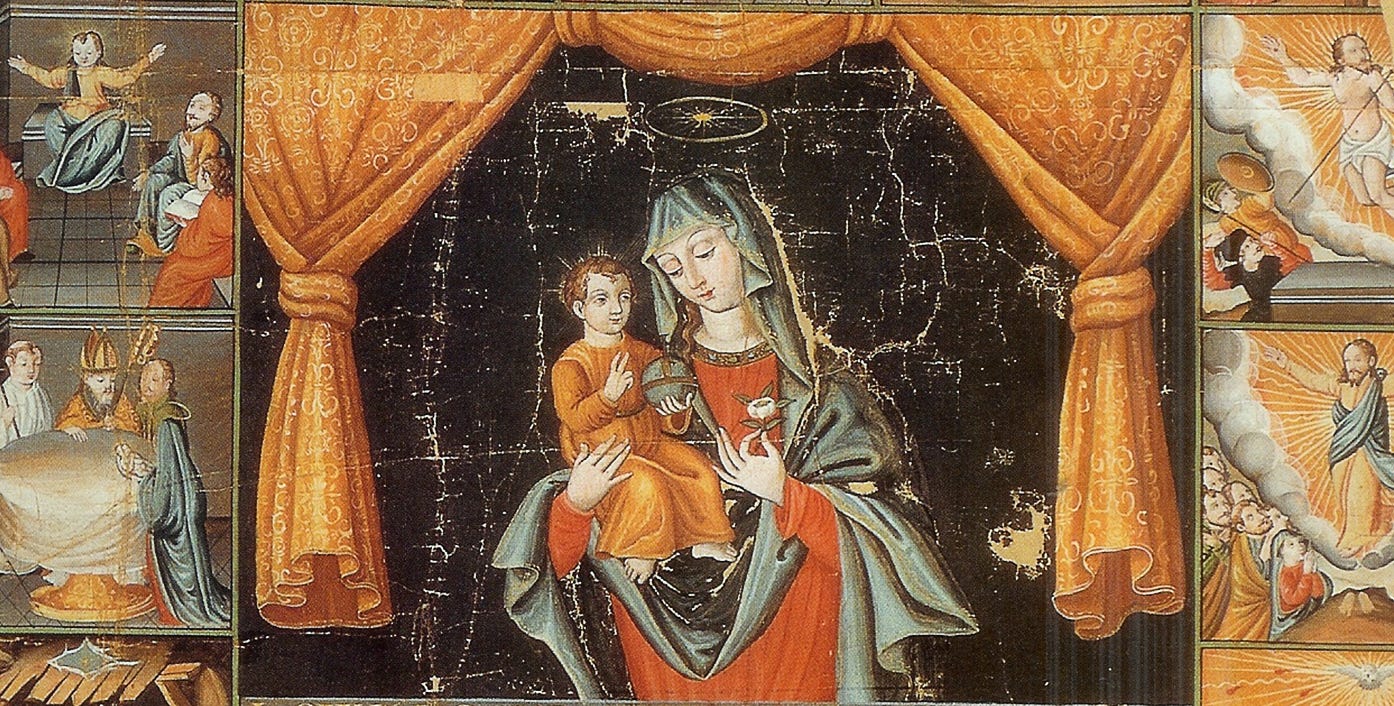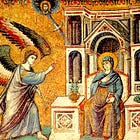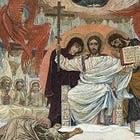The first proclamation that 'Christ is King'
At the Annunciation to the Blessed Virgin Mary, St Gabriel declared that Christ would be given the throne of David, and that his kingdom would have no end.

In this chapter, dealing with the second and third parts of the Annunciation, Fr Coleridge discusses…
What Our Lady understood of St Gabriel’s message about conceiving a son
The kingship and sovereignty of Jesus Christ
What Our Lady’s question for the Angel teaches us about discretion and trust.
See also:
Mary at the Annunciation
From
The Mother of the King—Mary During the Life of Our Lord
Fr Henry James Coleridge, 1886, Bk II, Chapter II, pp 88-101
St. Luke i, 26-38.
Headings added from contents page. Some line-breaks added.
Gabriel’s words to Our Lady
The silence of our Blessed Lady, [after St Gabriel’s initial greeting,] was an invitation to the Angel to speak again.
He began by bidding her have no fear. Fear is a natural feeling in any human being at the presence of a visitant from the other world. But besides this, there might have been other causes for fear in the case before us. Mary might fear delusion, and she might be frightened in various ways at the contents of the message. But she was not to fear, because she had found grace with God.
A visit from God unaccompanied by grace would be a cause for intense fear. But when He visits in love and favour, grace accompanies the visit as well as precedes it. The grace which Mary had found was twofold. She had been chosen by the free decree of God to be His Mother, and with the choice and the decree had come to her, or would come, the grace and strength and light and courage to accomplish, faithfully, perfectly, and successfully, the great task laid upon her. She need not fear, therefore, at the thought of so great a dignity, since the strength and grace which it required were ready.
It was the will of God, and the will of God is enough.
The first speech of the Angel had not gone beyond the declaration that Mary was blessed among women. To one so perfectly conversant with the Scriptural prophecies, these words of themselves would seem to contain the proposal of the Incarnation in her womb, or by means of her. For it was to the Mother of God that the title blessed among women naturally belonged, in a manner in which it could apply to no one else. St. Gabriel had said no more, just enough to convey to her what was meant.
We may certainly suppose that our Lady understood his meaning, and that her intelligence of it was an element among others in the necessity that she had felt for deep pondering and examination. But in his next words the Angel builds up, as it were, on the foundation he has laid.
Mary to conceive a Son
He carries the revelation of the purpose of God very far indeed beyond the first lines,
“Behold, thou shalt conceive in thy womb, and shalt bear a Son, and shalt call His name Jesus. He shall be great, and shall be called the Son of the Most High, and the Lord God shall give unto Him the throne of His Father David, and He shall reign in the house of Jacob for ever, and of His Kingdom there shall be no end.”
It is now then distinctly said that Mary is to become the Mother of a Son. She is to conceive in her womb, and to call His name Jesus. But the virginal character of the Conception is distinctly guarded, first, in the omission of all reference to her husband, as it was usually said in such announcements that the mothers should bear issue to their husbands, and again in the declaration that she is to call her Child by this name, whereas the giving of the name would belong naturally to the father.
In this case the language is so arranged that the father’s part is, thus far, excluded in the last sentence as it is omitted in the first. For our Lord was certainly to have no earthly father in the ordinary sense, and He was to be so entirely and exclusively the Child of His Mother, that in her was vested the whole parental authority by virtue of which the name was to be given.
Up to this, the revelation as to this point is negative, as if the Angel had been instructed by no word of his to wound the virginal intentions and rights of the Blessed Mother.
Scriptural character of the language
What is most remarkable about the arrangement of the remainder of the sentence is the completely Scriptural and prophetic character of the language.
It has been said that our Blessed Lady must be supposed to have been most deeply versed in the knowledge of the Scriptures, which, together with the sacrificial and liturgical system which was in full working in the Temple, must have been the great subject of her study while she was living in that holy retreat. The words of the Angel here would show how perfect was her knowledge.
For as, if an Angel were to address a saint in English or French or Italian, it would be a sign that that was the language native and familiar to the person so addressed, so when a messenger from Heaven addresses any one throughout in the words of Scripture, it is a sign that these words, and the whole region of thought to which they belonged, were most familiar to that person.
Our Lord is here spoken of, first as the Redeemer of the world, for that is conveyed in the name Jesus, as when the same name is afterwards revealed to St. Joseph it is said, “Thou shalt call His name Jesus, for He shall save His people from their sins.”
In the next place, our Lord is spoken of as great, and as the Son of God, and as to be known and honoured as such. For when it is said He shall be great, and shall be called the Son of the Most High, the second verb is not simply a variation of the former, but it implies that He shall be called by men, and therefore be known to be the Son of the Most High.
It may perhaps be thought that the name “Son of the Most High” does not in itself convey the idea of the Incarnate Son of God, because it is said of the saints, in the Psalms, “I have said ye are gods, and are all of you the sons of the Most High.”1
But the whole context shows that the Angel is using words which are to be understood in the highest and fullest sense of which they are capable, and that it would be falling beneath that sense to consider that he speaks only of one of the adopted sons of God. Our Lord is to be great, in the true sense, in which God alone is great, and in which in His Human Nature our Lord partakes of the greatness which belongs to Him in His Divine Nature.
This is a members’ article.
Sourcing and curating the texts, cleaning up scans, and editing them for online reading is a labour of love, and takes a lot of time.
If you value what we’re doing at The Father Coleridge Reader, will you give us a hand and keep the project alive?





